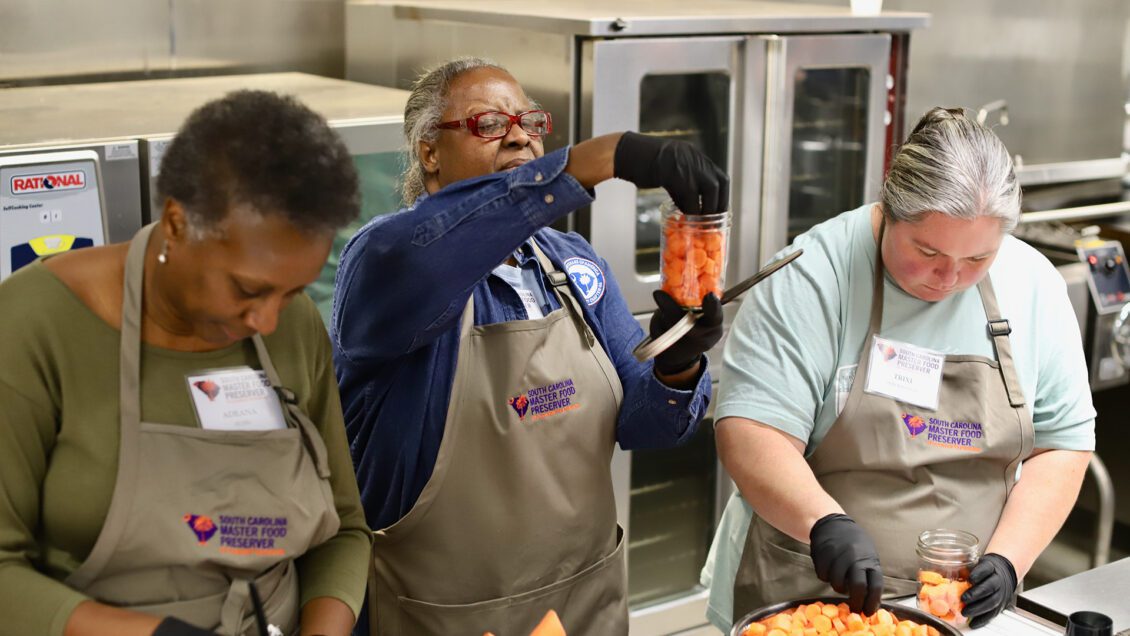
Food preservation has been a fundamental part of the Cooperative Extension Service since the organization was formed in 1914. Clemson University Extension agents continue this practice by offering programs such as the South Carolina Master Food Preserver certification program.
The Master Food Preserver program is designed to teach volunteers how to teach people in their communities about food preservation. In South Carolina, this program is taught by Clemson Extension agents.
A total of 36 people recently graduated from the first class in this program, led by Faith Isreal, Clemson Extension food systems and safety agent.
“The South Carolina Master Food Preserver program is an opportunity for volunteers to come in to learn and be certified and able to give that information back out to the public,” Isreal said. “These volunteers help extend our reach with our food demonstrations, provide assistance with county fair exhibits, school engagements, things of that nature.”
During the first phase of the program, students complete online lessons containing information on food preservation. They then take part in a two-day intensive hands-on learning to put that information into practice.
“By doing this, the students can be knowledgeable about these topics and be sure they’re giving out research-based non-biased information to the public,” Isreal said.
Topics for the first segment include basics to preserving and food safety, canning with boiling water, steam and pressure, pickling, dehydrating fruits and vegetables, freezing foods, and fermenting. During the second segment, participants are required to donate at least 40 hours of service projects to complete the program and receive the title of “South Carolina Master Food Preserver.”
Volunteer work may vary by county. Service projects include activities such as assisting with food preservation workshops, answering questions from the public, testing pressure canners, hosting canning demonstrations and more.
Following initial certification, 20 hours of educational service and 10 hours of continuing education each year are required.
Janet Chisolm-Richard of Dorchester County successfully completed the first class and said she “highly” recommends this program for everyone in South Carolina.
“We have food, and we need to preserve it,” Chisolm-Richard said. “We grew up knowing this stuff. It’s time to train the new people how to do it.”
Other participants agree the program is beneficial.
“I love the hands-on experience that we’ve gained here on site,” said Kathi Christy of Greenville County. “It’s been wonderful to gather with the other participants and learn from them and learn other resources and just get our hands into the food and learn the processes together.”
Bryan Yebba of Greenwood County sees food preservation as a way to extend the gardening season.
“I’ve had a blast being here,” Yebba said. “I got to meet a lot of people that were kind of like-minded, that have community gardens or their own home gardens that have an overproduction in their yards and they want to do some stuff with it. So canning is the best alternative method to extending your garden season.”
For people who missed participating in this first Master Food Preserver class, Isreal said plans are being made to hold another. Those interested in the next class can contact Isreal at fisreal@clemson.edu to have their names put on a waiting list. Anyone interested also can fill out the information request form at http://bit.ly/3Jwcb5d to receive notification about the next Master Food Preserver Training Class.
“People are already putting their names on the waiting list so that they can be in the next cohort and learn more and be able to spread their knowledge through Clemson Extension,” she said.
The Cooperative Extension Service was established by the federal Smith-Lever Act in 1914, in which each state’s land-grant college would extend its teaching of agriculture and related subjects beyond the classroom. This partnership between agricultural colleges and USDA enables the dissemination of information produced by the schools’ research. The National Institute of Food and Agriculture was established in 2008 to address issues such as food security, climate change, natural resource and environmental sustainability, bioenergy, childhood obesity prevention and food safety.
-END-
Get in touch and we will connect you with the author or another expert.
Or email us at news@clemson.edu
